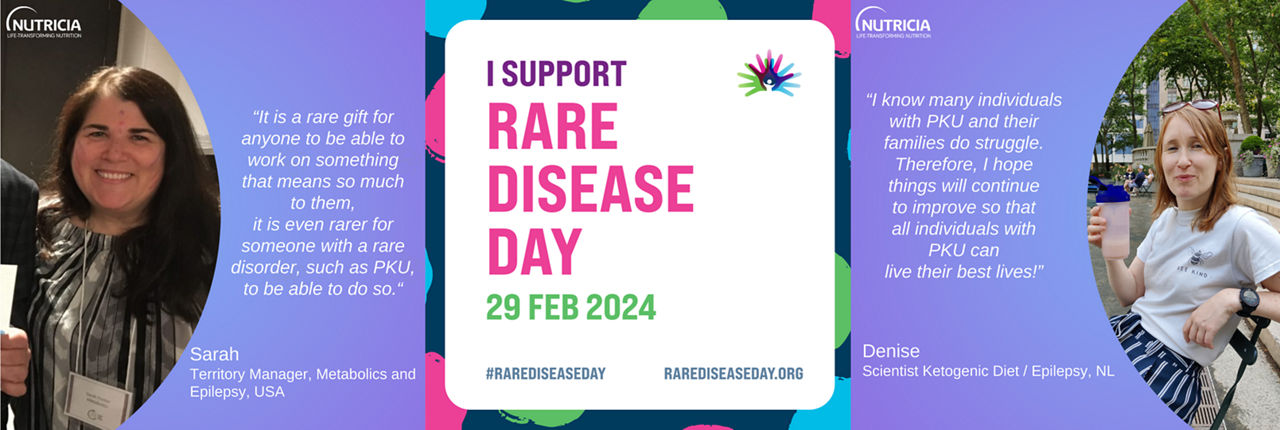The story of Lorraine and her son Harry
“Harry was just 6 days old when he was diagnosed with tyrosinemia type 1.
What this condition means for Harry is that he is now on a lifelong medication to prevent any brain, liver, or kidney damage. He follows a plant-based diet, using a synthetic form of protein to ensure a normal growth and development. “It is important to me that whatever we are having for dinner as a family, Harry’s food looks exactly the same.”
Every cloud does have a silver lining and even if it is a grey day and you’ve just been given a diagnosis, that your child has a condition, it will get better, but you must allow it to get better.”
Lorraine - Harry’s mother
Inherited metabolic disorders (IMDs), also known as inborn errors of metabolism (IEMs) are a group of rare disorders caused by genetic defects that affect the body's ability to break down particular nutrients in food e.g. amino acids. Inherited (most often via both parents) and detected shortly after birth by newborn screening, via a blood spot test. IMDs are usually caused by defects in enzymes that help break down ('metabolize') food, which results in the production of abnormal protein, which in turn can alter the normal functioning of cells. If not effectively managed, this build-up can lead to severe long-term health issues, including irreversible brain damage.
Among the most prevalent inherited metabolic disorders are phenylketonuria (PKU), maple syrup urine disease (MSUD), and tyrosinemia (TYR).
Each individual IMD is rare with an incidence ranging from 1:10.000 to 1:1.000.000
The incidence of all IMDs combined makes them more common with a global incidence ranging from 1:800 to 1:2.500.

The role of nutrition in inherited metabolic disorders (IMDs)
For many patients diagnosed with an IMD, a severely restricted diet, often for life, is the gold standard to optimise outcomes.
Nutricia is offering unwavering support for individuals providing nutritional solutions for the dietary management of over fifty-four known IMDs. We believe every person diagnosed with an IMD is entitled to thrive and live their best possible life.
Over 65 years of experience enables us to provide essential products and services to support adherence to a metabolic diet at every stage of life.

Maple syrup urine disease (MSUD)
Maple syrup urine disease is an inherited, genetic disorder casued by a defect in three enzymes that help break down protein from food. The name MSUD comes from the sweet smelling urine from untreated infants.

Tyrosinemia type 1 (HT1)
Tyrosinemia or TYR 1 (Tyrosinemia type 1*) is an inherited genetic disorder.TYR occurs due to a deficiency of the enzyme fumarylacetoacetate hydrolase (FAH). An FAH deficiency inteferes with the breakdown of an amino acid called tyrosine.

Phenylketonuria (PKU)
PKU stands for phenylketonuria. It is an inheirted metabolic condition that affects how babies, teens and adults break down protein. Many foods contain protein, which the body needs for growth and repair.

Glutaric aciduria type 1 (GA1)
Glutaric aciduria type 1 (GA1) also called glutaric acidemia type 1, is an inherited, genetic disorder. In countries where newborn screening is available, GA1 can be diagnosed in the first few days of life. GA1 occurs when there is a defect in an enzyme that helps break down protein from food into amino acids for use by the body.

29 February: Rare Disease Day
February 29 is the rarest day of the year. A day to raise awareness and advocate for equal opportunities, for people with a rare disease, to fully participate in society. As Nutricia we don’t only provide products, we have colleagues who know what it is like to live with a rare disease.
Are you a healthcare professional or (carer of) a diagnosed patient?
The product information for this area of specialization is intended for healthcare professionals or (carers of) diagnosed patients only, as these products are for use under healthcare professional supervision.
Please click ‘Yes’ if you are a healthcare professional or (carer of) a diagnosed patient, or ‘No’ to be taken to a full list of our products.
The information on this page is intended for healthcare professionals only.
If you aren't a healthcare professional, you can visit the page with general information, by clicking 'I'm not a healthcare professional' below.


